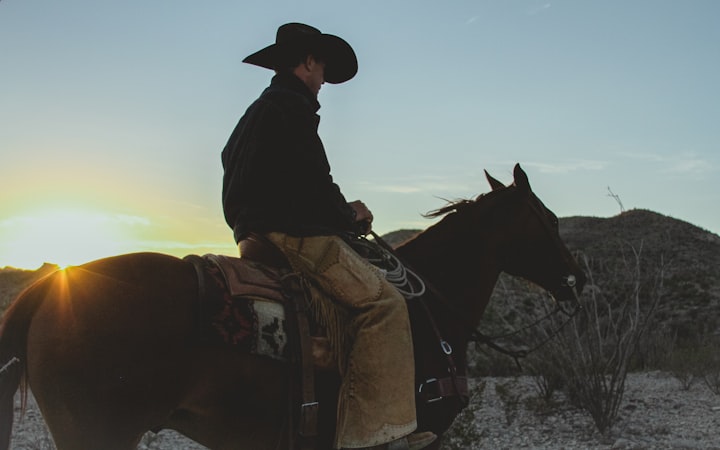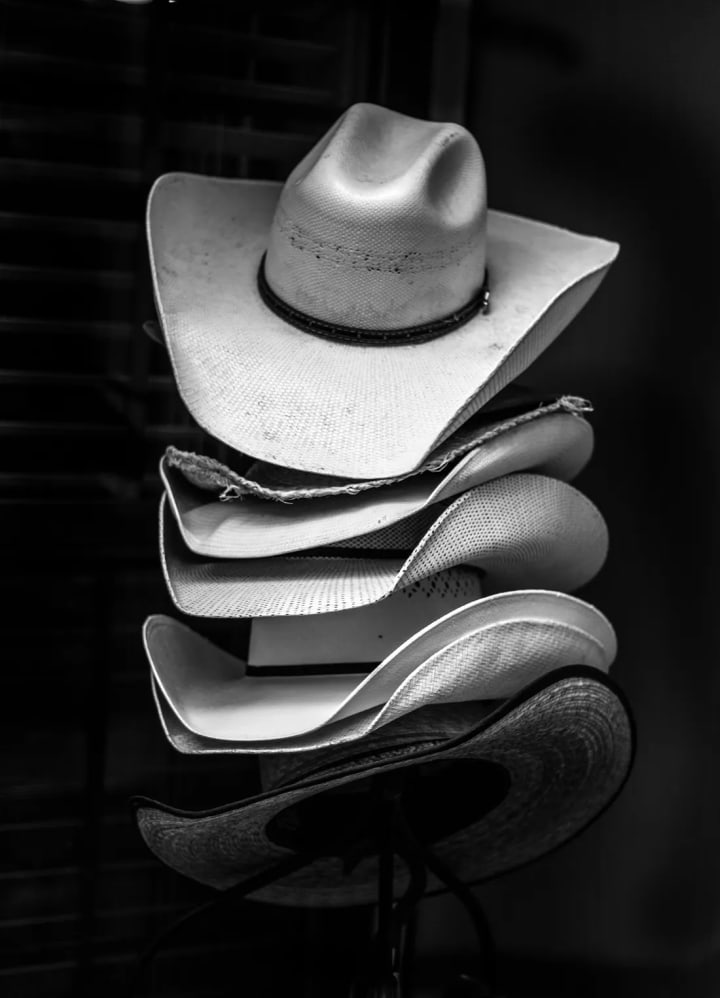The Enduring Appeal of the Cowboy: Symbol of American Culture and Values
The Cowboy’s Influence on American Identity

The Cowboy as an American Hero: Exploring the origins, mythology, influence, portrayal, and reinvention of the cowboy archetype as a symbol of American culture, values, and individualist freedom.
My Cowboy Journey, Sort Of
When I reached 60, I figured I was all gown up, and my headwear should resemble that of a grown man. You see, I was a baseball cap guy. I wore caps that mostly depicted my beloved U.S. Army. I decided to buy myself fedoras and Panama hats. They were attractive hats, and then I saw the Stetson Open Road. The classic Western cross-over hat was worn by LBJ, Ike Eisenhower, and Harry Truman. I was in love and bought myself four in different colors of fur felt. I felt confident wearing them and liked the look. I decided to buy a more traditional cowboy hat and take it for a spin. Well, 3 years and 40 hats later, I am an all-hat, no-horse cowboy.

A trip to Wyoming to check out the cowboy culture was next on my agenda. So I packed a couple Stetsons, and off we went. It was a great visit to a beautiful state with great folks. Oh, and many cowboy hats and that great hero of the American West, The Cowboy.

Cowboy Image Origins
The enduring symbol of the cowboy in American culture has a fascinating and complex history that extends far beyond the borders of the American West. Contrary to the common association of the cowboy with the Wild West, the original cowboys had no direct connection to this particular era. Instead, the image of the cowboy has its roots in Europe, reflecting a rich history of cultural influences that contributed to the formation of the cowboy archetype.
The influence of the Mexican cowboys, or vaqueros, cannot be overstated. As the direct predecessors to the American cowboy, they played a crucial role in shaping the cowboy’s identity and traditions. These vaqueros introduced many practices and customs now synonymous with the cowboy lifestyle, such as roping, riding, and cattle herding. Their impact on the cowboy image is a testament to the rich cultural exchange and evolution of the cowboy image, illustrating the diverse and multifaceted origins of this enduring symbol.
Alongside these influences, the cowboy’s evolution from European ancestry to the influence of the vaqueros provides a compelling testament to the cowboy’s rich and diverse heritage. The multifaceted background of the cowboy has contributed to the cowboy’s status as a symbol of resilience, independence, and bravery, encapsulating the spirit of the American frontier. This spirit is best represented by the transformation of the cowboy from a shepherd of cattle to a hero of the American West, embodying the uniquely American notion of manifest destiny.
This notion, the belief in Americans’ inherent right and destiny to expand and conquer new territories, is intrinsically tied to the image of the cowboy. The early frontiersmen, akin to the vaqueros and the European cowboys, embodied this spirit in their pursuit of new lands and opportunities in the vast expanse of the American West. The image of the cowboy, as a rugged individual confronting the wilderness, became a powerful symbol of this belief, reinforcing the idea of American exceptionalism and the nation’s destiny to expand.
Cowboy in American Mythology
Throughout American history, the cowboy has emerged as a powerful symbol in American mythology, deeply rooted in the history of the American West. Initially seen as rough and uncivilized, the cowboy has evolved into a romanticized icon embodying independence, toughness, and resilience.
This romanticization is evident in various forms of media, including literature and film, where the cowboy has been portrayed as a heroic figure. Take the example of John Wayne’s portrayal of the cowboy in classic Western films. Wayne’s characters, often rugged and stoic individuals, have contributed to the romanticization of the cowboy, further cementing this figure as an embodiment of American resilience and self-reliance.
This romantic portrayal of the cowboy extends beyond mere entertainment; it reflects a broader societal admiration for the cowboy’s qualities. The cowboy’s independence, toughness, and resilience resonate deeply with American values, reinforcing the notion of the self-made man who, through grit and determination, can overcome any challenge. This narrative has profoundly influenced the American psyche, influencing how Americans perceive themselves and their potential.
In addition to being a source of entertainment, the cowboy’s portrayal in literature and film has served an educational role, providing insight into the history and culture of the American West. Through the cowboy’s adventures, audiences have gained a deeper understanding of the struggles and triumphs that defined the American frontier. The hardships faced by the cowboy, from harsh living conditions to conflicts with Native Americans, reflect the realities of life in the American West, providing a realistic backdrop against which the cowboy’s heroism and resilience shine.
Cowboy’s Influence on American Identity
The cowboy’s influence on American identity is profound and far-reaching. Emerging from the vast landscapes of the American West, the cowboy has become a symbol of the nation’s rugged individualism and untamed spirit. This image has been imprinted on Americans’ collective consciousness, influencing their national identity and shaping global perceptions of American values and ideals.
One of the primary qualities associated with the cowboy is the embodiment of freedom and independence. Cowboys were often depicted as individuals who operated outside the confines of traditional society, forging their own path on the open range. This portrayal resonated with the American pioneer spirit, which celebrated the virtues of self-reliance and the pursuit of new frontiers.
The cowboy’s representation as a resilient and tough individual has also left an indelible mark on American culture. The cowboy’s ability to endure harsh conditions face adversity with stoicism, and triumph over challenges has been celebrated as a quintessentially American trait. These traits have been immortalized in countless stories, songs, and movies, inspiring generations of Americans to strive for resilience, independence, and perseverance.
The influence of the cowboy on American identity extends beyond the individual level. The cowboy has also played a significant role in shaping the broader societal values and norms in the United States. The cowboy’s code of honor, respect for the land, and commitment to hard work are principles that have been ingrained in the American ethos, influencing societal attitudes and expectations. The cowboy’s influence has permeated various aspects of American life, from how Americans view themselves to how they interact with each other and the world around them.
Cowboy Hero Portrayal
The portrayal of the cowboy hero has taken on various forms throughout history, each contributing to the enduring image of this iconic figure. From early myths and dime novels to Wild West shows and museum exhibits, the cowboy hero has been a central character in American storytelling. These narratives have not only entertained audiences but have also shaped the public’s perception of the cowboy, reinforcing the image of the cowboy as a symbol of independence, resilience, and adventure.
In addition to literature and exhibitions, Hollywood has played a pivotal role in immortalizing the cowboy hero on the silver screen. Countless films have depicted the cowboy as a rugged individualist, often embodying the values of bravery, loyalty, and honor. These portrayals have captivated audiences and contributed to the romanticization of the cowboy figure, further cementing their status as an enduring American icon.
The advent of television introduced new dimensions to the cowboy hero’s portrayal, allowing for more nuanced and diverse representations. Television series like “Gunsmoke” and “Bonanza” brought the cowboy into the living rooms of millions of viewers, showcasing the cowboy’s adventures and struggles in a relatable and captivating way. This shift in medium allowed for a deeper exploration of the cowboy’s character, further enriching the portrayal of the cowboy hero.
The portrayal of the cowboy hero is not limited to traditional media. In recent years, the cowboy has found a home in the digital world, with video games and online platforms providing new avenues for exploring and reimagining the cowboy narrative. Games like “Red Dead Redemption” have introduced a new generation to the cowboy hero, offering immersive experiences that allow players to step into a cowboy’s boots and navigate the American West’s challenges.

Cowboy and Individualist Freedom
The cowboy’s image as a symbol of individualist freedom is deeply rooted in the narrative of the American West. As the frontier began to close and corporate influence expanded, the cowboy came to embody the ideal of unbridled independence, standing as a powerful metaphor for the struggle against societal constraints. This was evident in the cowboy’s way of life: roaming the vast open spaces, herding cattle, and living by a strict code of honor and self-reliance.
The cowboy’s role as a defender of native American ways against encroaching immigrants from other cultural and racial backgrounds reflects the intricate relationship between the cowboy myth, freedom, and social constraint. For example, the cowboy’s portrayal in literature and film often depicted them as guardians of traditional American values, standing against the changing social landscape and the encroachment of foreign influences.
The cowboy’s representation as a symbol of individualist freedom also reflects a broader societal context. During the American frontier era, the United States was undergoing significant changes, with the rapid expansion of the railroad and the rise of big corporations. In this changing socio-economic landscape, the cowboy stood as a symbol of resistance, embodying the struggle against the encroachment of societal constraints and the preservation of individual freedom.
Moreover, the cowboy’s portrayal as a defender of individual freedom has profoundly impacted American culture and identity. It has shaped the American ethos, reinforcing values such as self-reliance, independence, and resilience. The cowboy’s struggle for freedom and resistance against societal constraints has resonated with the American spirit, influencing societal attitudes and expectations. This enduring image of the cowboy as a defender of individual freedom has cemented its place in American mythology, reinforcing the cowboy’s status as an enduring symbol of American values and ideals.
Reinvention of Cowboy Tradition
In contemporary times, the cowboy tradition has undergone a significant reinvention. This process has been particularly evident in the context of the established myth of Reagan’s America, where the cowboy was used as a symbol of American strength and resilience. This reinvention reflects a broader cultural shift in how the cowboy is perceived and understood, leading to a resurgence of interest in the cowboy tradition and the Western movie genre.
The enduring appeal of the cowboy, characterized by its association with independence, bravery, and rugged individualism, continues to captivate the imagination of people around the world. This enduring appeal has driven the reinvention of the cowboy tradition, ensuring its relevance in contemporary society. The cowboy’s representation of freedom and resilience has been reimagined in various forms of media, from literature to film, emphasizing its significance in modern culture.
The resurgence of the Western movie genre is a testament to the enduring appeal of the cowboy hero. This renewed interest in the cowboy tradition has led to a more diverse and inclusive portrayal of cowboys, acknowledging the contributions of vaqueros and other cultural influences to the cowboy tradition. This reinvention not only breathes new life into the cowboy myth but also paves the way for a more comprehensive understanding of the cowboy’s role in shaping American identity and global culture.
Moreover, the reinvention of the cowboy tradition also reflects a broader societal trend towards diversity and inclusivity. This shift has led to a greater recognition of the diverse cultural influences that have shaped the cowboy tradition, leading to a more nuanced and multifaceted portrayal of the cowboy in literature, film, and popular culture. This diversification of the cowboy tradition has enriched the cowboy narrative, providing fresh perspectives and insights into the cowboy’s role in American history and culture.
Cowboy and American Capitalism
The cowboy’s connection to American capitalism extends beyond economic activities, deeply intertwined with the American ethos of individualism and freedom. As a myth of an ultra-individualist society, the cowboy has become an unusually effective vehicle for dreaming, capturing the imagination of individuals who aspire to the ideals of self-reliance and rugged individualism. This embodiment of the American ethos has contributed to the cowboy’s enduring appeal, both within and globally, as a symbol of the pioneering spirit that defines the American identity.
Furthermore, the cowboy’s representation in popular culture has reinforced the association between the cowboy and American capitalism. Iconic Western movies often depict cowboys as resilient figures who navigate the challenges of the untamed frontier, mirroring the American entrepreneurial spirit that seeks to conquer new frontiers and overcome adversity. This portrayal has not only solidified the cowboy as a hero in the popular imagination but has also reinforced the link between the cowboy archetype and the values of American capitalism, further perpetuating the enduring allure of the cowboy.
The cowboy’s association with American capitalism is symbolic and reflects the American West’s historical realities. During the frontier era, cowboys played a crucial role in the cattle industry, a significant economic driver in the American West. The cowboy’s work, which included herding cattle, managing ranches, and navigating the challenges of the untamed frontier, was instrumental in the American West’s development and the American economy’s growth.
Our Conclusion
The cowboy’s enduring appeal as a symbol of American culture and values is deeply rooted in its rich and multifaceted history. From its origins outside the American West to its transformation into a romanticized figure, the cowboy continues to capture the imagination as an embodiment of independence, bravery, and rugged individualism. The significance of the cowboy in American culture and its global influence underscores its status as an iconic and enduring American hero.
The cowboy has been immortalized in literature, film, and popular culture, with countless stories and characters portraying the cowboy as a resilient and self-reliant figure. For example, in literature, the cowboy hero is often depicted as a lone and stoic individual facing the challenges of the untamed frontier, representing the triumph of the human spirit over adversity. This portrayal has resonated with audiences, contributing to the enduring popularity of the cowboy archetype.
Furthermore, the cowboy’s influence on American identity and culture cannot be overstated. The cowboy’s code of ethics, dedication to hard work, and respect for nature have shaped the perception of American values and ideals both domestically and internationally. The cowboy’s influence has permeated various aspects of American life, from how Americans view themselves to how they interact with each other and the world around them.
In conclusion, the cowboy stands as a testament to the resilience and fortitude that have come to define the American spirit. Despite the challenges and changes that have marked American history, the cowboy remains a powerful symbol of the nation’s values and ideals. As a symbol of freedom, independence, and resilience, the cowboy continues to inspire and captivate, embodying the American West’s spirit and the American dream’s enduring allure.
For A Bit of Cowboy Fun
About the Creator
Matthew Jack
My 30-year law enforcement career fuels my interest in true crime writing. My writing extends my investigative mindset, offers comprehensive case overviews, and invites you, my readers, to engage in pursuing truth and resolution.
Enjoyed the story? Support the Creator.
Subscribe for free to receive all their stories in your feed. You could also pledge your support or give them a one-off tip, letting them know you appreciate their work.






Comments
There are no comments for this story
Be the first to respond and start the conversation.